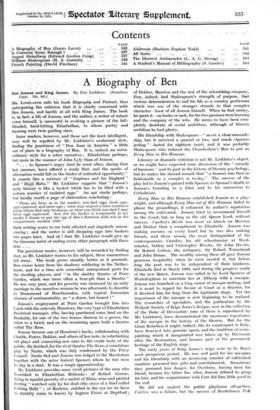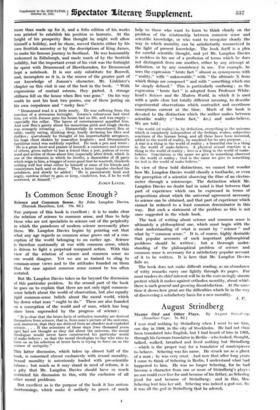A Biography of Ben
Ben Jonson and King James. By Eric Linklater. (Jonathan Cape. • 10s. 6d.) Ma. LINKLATER calls his book Biography and Portrait, thus anticipating the criticism that it is chiefly concerned with Ben Jonson, and hardly at all with King James. The book is, in fact, a life of Jonson, and the author, a writer of robust verse himself, is successful in evoking a picture of the full- blooded, hard-hitting Elizabethan, to whom poetry and learning were twin guiding stars.
Some readers, however, and those not the least intelligent, may well be repelled by Mr. Linklater's exuberant style, finding the jauntiness of " Don Juan in America " a little out of place in a biography of Ben. It is, indeed, an extra- ordinary style for a sober narrative : Elizabethan perhaps, but more in the manner of John Lyly than of Jonson.
" . . . to Spenser's angry steel he must often, during that hot summer, have offered a ready flint, and the sparks of altercation would fall on the tinder of unlimited opportunity." It sounds like a mixture of " Euphues and his England " and " Hajji Baba." Mr. Linklater suggests that " Jonson"s early history is like a basket which has to be filled with a certain number of undated eggs." An apt simile perhaps, but hardly worth a page of elaboration concluding :
" There are here, as in the market, new-laid eggs: fresh eggs, eggs equivocal, and mere eggs ; some may suspect a faint mustiness where others find only freshness, or what you think new-laid I may fancy eggs, equivocal. And (for the basket is temporarily in my hands) I choose to put the egg of Ben's flirtation with war in the compartment marked 1590." •
Such writing seems to me both affected and singularly uncon- vincing ; and the writer is still dropping eggs into baskets two pages later. And oh ! that Mr. Linklater would give up the tiresome habit of ending every other paragraph with three dots . .
The persistent reader, however, will be rewarded by finding that, as Mr. Linklater warms to his subject, these mannerisms fall away. The- book grows steadily better as it proceeds. Ben comes home from his shadowy soldiering in the Nether- lands, and for a time acts somewhat unimportant parts for the strolling players, and " in the shabby theatre of Paris Garden, which was more often a bear-pit than a theatre." He was very poor, and his poverty was increased by an early marriage to the nameless woman he was afterdards to describe to Drununond of Hawthornden, with typical Jonsonian absence of sentimentality, as " a shrew, but honest ! "
Jonson's employment at Paris Garden- brought him into touch with the unlovely Hcnslowe, the very type of Elizabethan
theatrical manager, who, having purchased some land on the Bankside, let one of the two houses thereon to a grocer, the other to a bawd, and on the remaining space built a theatre called The Rose.
Jonson became one of Henslowe's hacks, collaborating with Chettle, Porter; Dekker, and others of less note, in refurbishing old plays and concocting new ones to the crude taste of the public. He finished, for the rival theatre The Swan, a scandalous play by Nashe, which was duly condemned by the Privy Council. Nashe fled and Jonson was lodged in the Marshalsea together with the actor Gabriel Spenser, whom he was soon to slay in a duel. It was a rough apprenticeship.
Mr. Linklater provides some vivid pictures of the men who flourished in Elizabethan Bohemia : of Robert Greene, dying in squalid poverty of a surfeit of Rhine wine and pickled herring " watched only by his drab (the sister of a thief called Cutting Bull) " ; of Marlowe, stabbed in the eye (as we have so recently :come to know) by Ingram Friser at Deptford ; of Dekker, Marston and the rest of the astonishing company. Fekr,,„ indeed, had Shakespeare's strength of purpose, that curious determination to end his life as a country gentleman which- was one of the stranger strands in that complex character—least of all Jonson himself. When he had money, ' he spent it---on-books or sack, for his two passions were learning and the company of the wits. He seems to have been com- pletely destitute of social ambitions, although of literary ambition he had plenty.
His friendship with Shakespeare—" never a elose-eoturade- ship, but it survived a quarrel or two, and much vigorous jesting "—lasted. for eighteen years, and it was probably Shakespeare who induced the Chamberlain's Men to put on Every Man in His Humour.
Literary or dramatic criticism is not Mr. Linklater's object, or we might have expected. some discusSion of the " comedy of humours " and its part in the history of literary psychology, but he makes the shrewd remark that " a humour was then as fashionable as a complex is to-day." The success of the play led to Jodson's qttarrel With Spenser, to Spenser's death, to Jonson's branding as a felon and to his conversion to Catholicism: Every Man in His Humour established Jonson as a play- wright, and although Every Man out of his • Huinour failed to please the groundlings, it enhanced its author's reputation among the cultivated. Jonson tried to recommend himself to the Court, but, so long as the old Queen lived, without success. Cynthia's Revels was more an attack on Marston and Dekker than a compliment to Elizabeth. Jonson was making enemies on every hand but he was also making friends, and those among the most distinguished of his contemporaries—Camden, his old schoolmaster at West- minster, Selden and .Christopher Brooke, Sir John Davies, Sir Robert Cotton, the antiquary, Sir Robert Townshend and JOhn Donne. The wealthy among these all gave Jonson generous hospitality when he most needed it, but before long the poet was to be independent of their kindness. Elizabeth died in March 1603, and during the progress south of the new Queen, Jonson was called in by Lord Spencer of Wornileighton to entertain her at Althorp with a masque. Jonson was launched on a long career of masque-writing, and it is usual to regard his favour at Court as a disaster, for it diverted hint for long from the legitimate stage. Yet the importance of the masque is now beginning to be realized. The researches of specialists, and the publication by the Walpole Society of Inigo Jones's designs, now in the collection of the Duke of Devonshire (one of them is reproduced by Mr. Linklater), have demonstrated the enormous importance of the masque in the history of the theatre. But for the Great Rebellion it 'night, indeed, like its counterpart in Italy, have flowered into genuine opera, and the tradition of scene- painting which it inaugurated was taken up by 1)avenant after the Restoration, and became part of the permanent heritage of the English stage.
The early years of King James's reign were to be Ben's most prosperous period. He was well paid for his masques and his friendship with an increasing number of cultivated courtiers 'procured him gifts and entertainment. Sometimes they procured him danger, for Overbury, having been his friend, became his bitter foe, when Jonson refused to pimp for him, and his acquaintance. with Carr did.hird little good in the end.
He did not neglect the public playhouse altogetheti. Catiline was a failure, but the success of Bartholomew Fall
more than made up for it, and a folio edition of his. works was printed to establish his position as laureate. At the height of his prosperity Ben thought he might well allow himself a holiday, and he chose, moved thereto either by his own Scottish ancestry or by the descriptions of King James, to make his famous journey to Scotland. He was honourably welcomed in Edinburgh, and made much of by the Scottish nobility, but the important event of his visit was the fortnight he spent with Drummond of Hawthornden, for Drummond kept a notebook. It is our only substitute for Boswell, and, incomplete as it is, is the source of the greater part of our knowledge of Jonson's character. Mr. Linklater's chapter on this visit is one of the best in the book. " With expressions of mutual esteem, they parted. A strange stillness fell on the house when Ben was gone." On his way south he sent his host two poems, one of them jesting on his own corpulence and " rocky face."
" Drummond read it a little sourly. He was suffering from the reaction of a strenuous fortnight. Jonson's robustness had tired him, yet with Jonson gone his house had no life, and was empty— especially the cellar. The havoc of entertainment appalled him. And now Ben's gaiety about his monstrous girth and rough cheeks was strangely irritating . . . Distastefully he remembered Ben at table, vastly eating, drinking deep, loudly declaring his likes and dislikes ; querulously he thought of his imperturbable arrogance, his huge chest shaken by masculine laughter ; and Drummond's fastidious mind was suddenly repelled. He teok a pen and wrote :
• He is a great lover and praiser of himself, a contemner and scorner of others, given rather to lose a friend than a jest, jealous of every word and action of those about him (especially after drink, which is one of the elements in which he liveth), a dissembler of ill parts which reign in him, a bragger of some good that he wanteth, thinketh nothing well but what either he himself or some of his friends and countrymen hath said or done.' Then a fairer impulse checked his petulance, and slowly he added : ' He is passionately kind and angry, careless either to gain or keep, vindictive, but, if he be well answered, at himself."' JAMES LAVER.















































 Previous page
Previous page